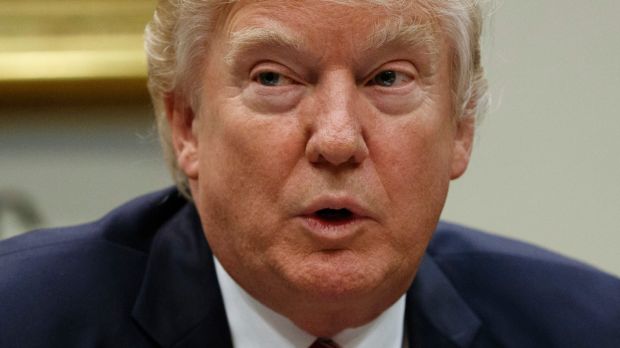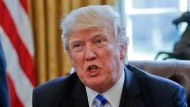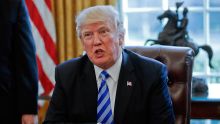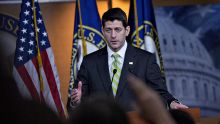Washington: Donald Trump's bid to ram a new healthcare system through Congress collapsed in a heap on Friday after rebel Republicans refused to bend to a presidential ultimatum that they all should back the controversial bill.
"We just pulled it," Trump said of the abandonment for the second time in as many days of a scheduled house vote, after House Speaker Paul Ryan had briefed him on the failure of a frenzied overnight effort to marshal votes.
More World News Videos
Healthcare failure a blow to Trump, GOP
US President Donald Trump and Republican leaders pulled legislation to overhaul the nation's healthcare system.
Undaunted by Thursday's demonstration that the numbers were not there, the White House insisted early on Friday that a vote be taken at 3.30pm.
The planned vote was to come despite the risk of political damage and personal humiliation for Trump.
The reversal of the major welfare program was intended to be the ultimate humiliation of former President Barack Obama.
For now, at least, Obama's Affordable Care Act continues to operate.
Instead of getting out to explain its replacement, Republicans are fending off questions on their ability to deliver on other key campaign promises – like tax reform and a massive $US1 trillion infrastructure investment program.
A stunning take-away from the cancellation of Friday's vote is that despite controlling the White House and the two chambers of Congress, the GOP revealed itself to be incapable of delivering on a promise that it had been making to Americans for seven years.

A chastened Ryan, who was the author of the new health proposal, said: "Obamacare is the law of the land.... We're going to be living with Obamacare for the foreseeable future."
Brooding on the consequences for the GOP, Ryan warned that delivering tax reform likely would be more difficult, but not necessarily impossible. "Being against things is easy" he said. "Governing was harder."

On Fox News, Trump spokesman Sean Spicer warned the rebels: "At the end of the day, this is the only train leaving the station that's going to repeal Obamacare."
But the train didn't leave.

Talking up the vote before it was cancelled, Alabama Republican Bradley Byrne described it to The Washington Post as "the first big vote in the presidency of Donald Trump. I think it's a statement, not just about him and the administration, but about the Republican Party and where we're headed."
"So much about political power is about perception. And if the perception is that you can't get your first big initiative done, then that hurts the perceptions down the road about your ability to get other big things done."

There was an air of foreboding too in the changing tenor of tweets through the day by Trump loyalist and former House Speaker Newt Gingrich.
Before breakfast Gingrich tweeted: "No one should be confused. Obamacare repeal if it passes will be Trump's triumph. He personally intervened to save the bill when it faced defeat." But after lunch he tweeted this: "Why would you schedule a vote on a bill that is at 17 per cent approval. Have we forgotten everything that Reagan taught us?"
Cancellation of the vote came after days of uncertainty and confusion, with many lawmakers complaining of having lost track of what was in or out of the bill as the White House frantically sought to appease opponents.
With the GOP congressional conference deeply divided, the challenge was that an inducement geared to winning votes at one end of the spectrum risked driving votes away at the other.
The House Republican #TrumpCare health bill. ↓ pic.twitter.com/tk9sxgXYQa
— House Democrats (@HouseDemocrats) March 24, 2017
The GOP's American Health Care Act does away with the Obamacare prescription for most Americans to have health insurance, offering instead age-based tax credits as an incentive to buy insurance. Over time, it would save billions of dollars but is predicted to see as many as 24 million drop their insurance – either by choice or because they could no longer afford it.
A key obstacle for conservatives was the survival in the new bill of Obamacare provisions that Trump had undertaken, as a candidate, to preserve, in particular a right for parents to keep children on their policies to age 26 and a bar on insurers refusing to cover pre-existing conditions.
Some 'no' votes shifted to Trump and Ryan's side. But there were high-profile acts of defiance.
Moderate New Jersey Republican and influential House committee chairman Rodney Frelinghuysen said in a statement: "Seven years after enactment of Obamacare, I wanted to support legislation that made positive changes to rescue health care in America - unfortunately, the [bill] is currently unacceptable as it would place significant new costs and barriers to care on my constituents in New Jersey."
Texas lawmaker Louie Gohmert, a strong Trump supporter, refused to side with the White House, arguing: "A no vote means we save Donald Trump from a Democratic majority in 2019."
Trump lacked his usual confident air.
When a reporter visiting the Oval Office asked what he'd do if the vote failed, he replied only: "We'll see what happens."
The previous evening, his aides had issued an ultimatum to lawmakers - vote for the GOP bill or live with the political consequences of the survival of Obamacare, which they had railed against for the best part of a decade.
Trump tweeted early on Friday: "After seven horrible years of Obamacare (skyrocketing premiums, deductibles, bad healthcare), this is finally your chance for a great plan!"
And showing frustration at the refusal of the conservative Freedom Caucus to bend to his will, he took a crack at its members – "The irony is that the Freedom Caucus, which is very pro-life and against Planned Parenthood, allows PP to continue if they stop this plan!"
At stake for Trump was his reputation as a "deal-maker" and "the closer."
Briefing reporters, Spicer said the president had personally lobbied 120 lawmakers, either in person or on the phone. Asked if Trump would continue to fight if he lost Friday's vote, Spicer said, "This is it."
The outcome amounts to failure for Trump's Art of the Deal, businessman's approach to politics. His Thursday ultimatum for GOP lawmakers to take it or leave it, was in keeping with his advice in the 1987 book of that name - "Much as I wanted to build a great casino on the great site I'd assembled, I said, I have a very successful real estate business in New York and I was more than willing to walk away from Atlantic City if the regulatory process proved to be too difficult or too time-consuming."
But Trump also wrote advice that he seems to have ignored this week: "The worst thing you can possibly do in a deal is seem desperate to make it. That makes the other guy smell blood, and then you're dead."















